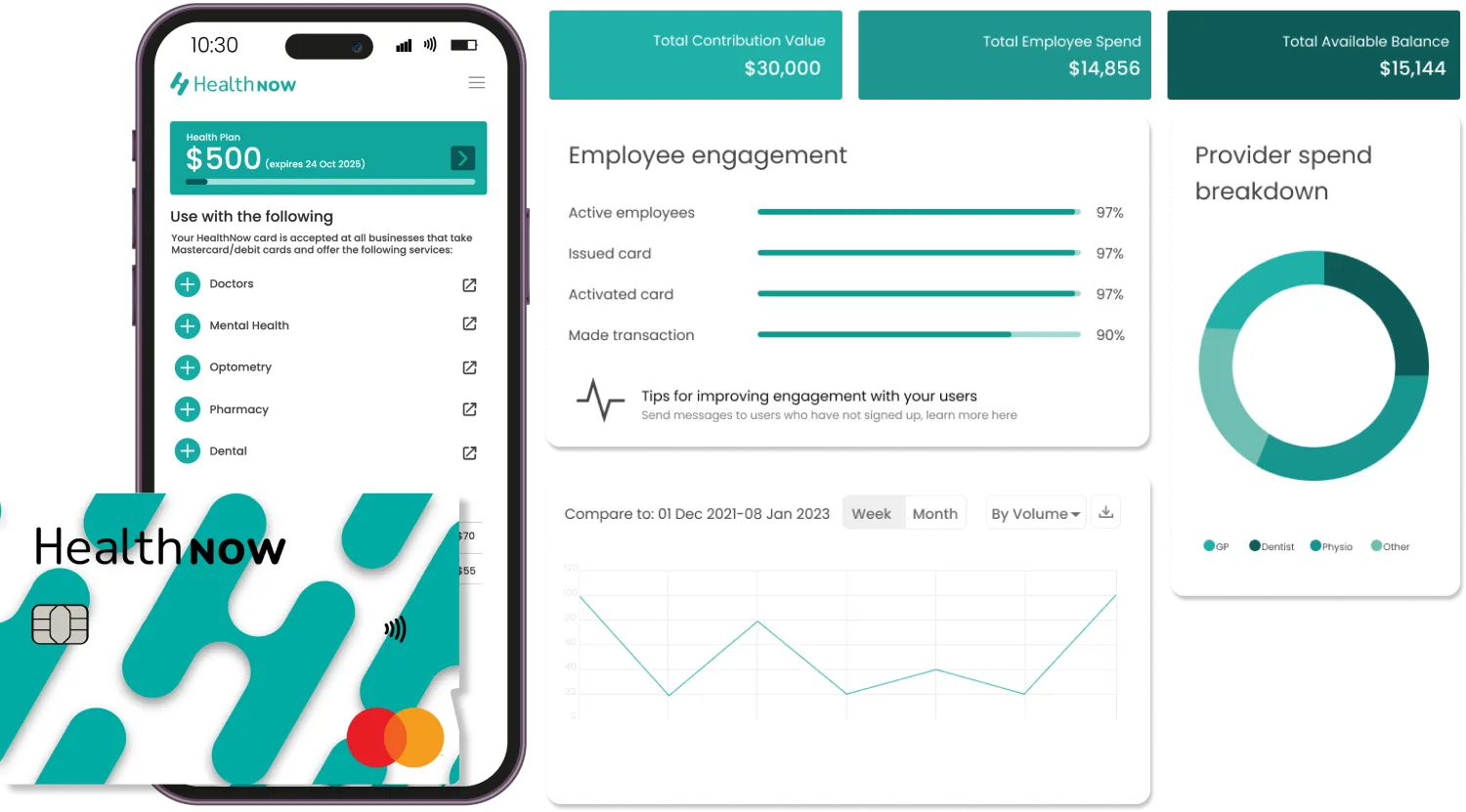 Maintaining good nutrition is synonymous with leading a healthy lifestyle, staying active, and maintaining an ideal weight range. But regardless of how a person chooses to spend their downtime and weekends, good nutrition is also just as important when it comes to helping optimise an employee’s work performance – and therefore the benefits to an employer.
Maintaining good nutrition is synonymous with leading a healthy lifestyle, staying active, and maintaining an ideal weight range. But regardless of how a person chooses to spend their downtime and weekends, good nutrition is also just as important when it comes to helping optimise an employee’s work performance – and therefore the benefits to an employer.
Here are five ways that poor nutrition could be holding your employees – and your business – back, as well as what you can do to support your team in promoting their mental, emotional and physical health through adequate, balanced nutrition.
-
Poor Nutrition Can Lead To Decreased Energy And Productivity
Consuming a diet that has poor nutrient quality can lead to poor energy levels and productivity because the body relies on the foods we consume for all its essential functions and processes. So when our nutrition is lacking or out of balance, problems can arise like not being able to produce steady energy throughout the day to keep us concentrated, focused and productive. This is often seen in diets filled with processed foods, saturated fats and sugar, where blood sugar levels (and insulin) spike, followed by a quick crash, leaving your team feeling lethargic, unfocused and reaching for their next coffee or sugar fix, only to repeat the cycle.
Having a diet that lacks fibre, which is essential for digestive health and satiety, can also lead to feelings of hunger and low energy levels, making it difficult to focus and be productive. Depletions in essential vitamins and minerals, including iron, magnesium, and B vitamins, can lead to anaemia, fatigue, and poor cognitive function. This can affect memory, concentration, and decision-making abilities in the workplace.
-
Poor Nutrition Impacts Mental Health
A diet lacking in essential nutrients can contribute to stress, depression and anxiety, which can have devastating effects on your employees both personally and professionally. Research has shown that diets high in processed foods, sugar, and unhealthy fats may increase the risk of depression and anxiety, while diets high in fruits, vegetables, whole grains, and lean protein have been associated with a reduced risk of mental health disorders.
One mechanism through which poor nutrition can affect mental health is by altering the balance of neurotransmitters in the brain. Neurotransmitters are chemical messengers that help regulate mood, behaviour, and other physiological processes. A diet lacking in certain nutrients such as omega-3 fatty acids, B vitamins, and magnesium can lead to imbalances in neurotransmitters such as serotonin, dopamine, and norepinephrine, which can contribute to the development of depression and anxiety.
Additionally, poor nutrition can lead to inflammation in the body, which has been linked to a variety of mental health disorders including depression, anxiety, and schizophrenia. Inflammation can also impair cognitive function, making it difficult to focus and concentrate on tasks at work.
-
Poor Nutrition Is Linked To Absenteeism And Presenteeism
Poor nutrition is linked to both absenteeism (when employees are absent from work) and presenteeism (when employees attend work despite being unwell or unable to perform their duties effectively). A diet lacking essential nutrients can contribute to a range of health problems, including chronic diseases such as obesity, diabetes, and heart disease, which can lead to increased absenteeism due to sickness or medical appointments. Poor nutrition can also contribute to poor mental health, as discussed earlier, which can lead to increased absenteeism due to mental health disorders such as depression and anxiety.
Additionally, poor nutrition can lead to decreased energy levels, poor cognitive function, and impaired physical performance, which can contribute to presenteeism in the workplace. Employees who are not getting the necessary nutrients to support their physical and mental health may struggle to stay focused, be less productive, and make more mistakes on the job. This can have a negative impact on the quality of their work and they may require more time and effort to complete tasks, leading to reduced efficiency and productivity.
-
Poor Nutrition Deflates Morale And Engagement
A diet lacking essential nutrients can lead to physical and mental health problems, as discussed earlier, which can result in decreased motivation, lower job satisfaction, and reduced engagement with work. Aside from feeling more tired, sluggish, and having lower levels of energy, employees may also be more susceptible to illness, leading to increased absenteeism and reduced engagement with their work.
Struggling with issues like depression and anxiety also leaves many feeling overwhelmed, disengaged, and less motivated to perform their job duties, while potentially experiencing greater difficulty interacting with colleagues, and being more likely to withdraw from social interactions. All this can lead to reduced morale, and engagement, and can negatively impact the workplace culture or environment.
What Can Be Done To Support Good Nutrition For Your Team?
While many workplaces are quick to launch incentives like fruit baskets, the provision of snacks or weekly lunches, this is a very temporary and low-level solution to a much greater problem: a lack of information about how to make the best nutritional choices for their bodies and their specific circumstances. Something that can be solved by giving those in your team (who want or need it) access to a dietitian, or a nutritionist.
What Do Dietitians Do?
 Instead of giving employees a meal plan that combines a range of nutritious foods and leaving them to implement it (or not) themselves, dietitians start with comprehensive assessments that can include a nutritional analysis, anthropometric assessment, body composition analysis and more. These help to provide a complete picture of their bodies, understanding their food preferences, their medical conditions and medications, their goals, their vitamin, mineral and other nutrient levels and deficiencies, and much more – all in the context of their age and activity levels, as dietary needs change with age.
Instead of giving employees a meal plan that combines a range of nutritious foods and leaving them to implement it (or not) themselves, dietitians start with comprehensive assessments that can include a nutritional analysis, anthropometric assessment, body composition analysis and more. These help to provide a complete picture of their bodies, understanding their food preferences, their medical conditions and medications, their goals, their vitamin, mineral and other nutrient levels and deficiencies, and much more – all in the context of their age and activity levels, as dietary needs change with age.
Next, their plan is created – and the benefits to a person’s quality of life can be significant:
- Improving mental outlook
- Feeling mentally and physically better
- Having more energy for daily activities
- Building resistance to illnesses and infections
- Sleeping better at night
- Being able to cope with stress
- Reducing the risk of some health conditions
- Keeping weight under control
The tools that form a person’s plan can include shopping tours, in-home cooking demonstrations, nutrition coaching and counselling, meal and menu ideas, and much knowledge about what nutrition really is, and what it should look like for you specifically.
This means that your team members are equipped with both the knowledge and the tools that enable them to make the best nutritional decisions that support their lifelong health and well-being.
Enabling Nutrition Care With Employer Aid
One simple and proactive approach that companies are currently taking to make nutritional support and dietetians accessible is offering employer aid payments with HealthNow. This is an alternative to contributing to health insurance payments, and instead putting funds into a dedicated health wallet for employees who can use the funds how they need to and when they need to – without the restrictions, limitations and stand-down periods imposed by private health insurance providers. This gives employees full control of how they want to support their health – with the caveat being that all payments must be used for health services affiliated with HealthNow.
How Does Employer Aid Work?
Employer Aid allows you, as an employer, to put money directly into your employee’s dedicated health wallets which can be used for a range of medical and health needs for your employee and their family. You choose how much to give and at what frequency. Unlike private health insurance, nothing is ‘lost’ if it’s not used – your employees keep the funds in their account until they use them, and the funds can be returned to you if your employee resigns. By giving your team control and flexibility over how to best care for their health, and giving them the opportunity to improve their nutrition in the first place, you’re setting your team up for success while showing that you genuinely care – a big drawcard when it comes to hiring new staff and retaining them.
To get your workplace on board with HealthNow’s Employer Aid programme, contact our friendly team here.






